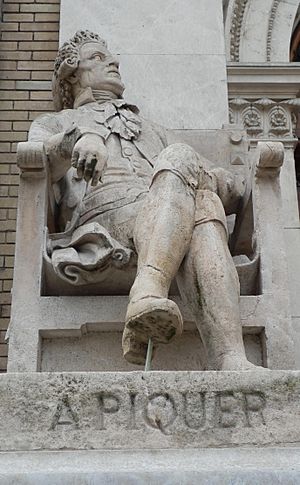Andrés Piquer facts for kids
Andrés Piquer (1711–1772) was an important Spanish doctor, philosopher, and writer. He lived during the 1700s. Piquer helped change how medicine was taught in Spanish universities. He focused on the ideas of Hippocrates, an ancient Greek doctor. Piquer also served as a doctor and thinker for two Spanish kings, Ferdinand VI and Charles III.
Piquer is well-known for translating Hippocrates' medical writings from ancient Greek into Spanish. He also worked hard to make sure that medical schools in Spain taught Hippocratic ideas. His translations and comments on important medical texts, like Epidemics 1 and 3, were very significant. His medical work was influenced by Hippocrates and by Thomas Sydenham, an English doctor sometimes called 'the English Hippocrates'.
Contents
Early Life
Andrés Piquer was born in Spain. His father was from Aragon, and his mother was from Valencia. He first studied Latin and grammar in a town called La Fresneda.
In 1727, when he was 16 years old, Piquer moved to Valencia. He then studied at the University of Valencia. In 1734, he finished his studies in both philosophy and medicine.
Piquer's Career
First Important Works
In 1735, Piquer published his first book, Medicina Vetus Et Nova. This book helped him get important jobs. He became a doctor at the General Hospital of Valencia. He also worked at the University of Valencia. The university asked him to research health in the city and nearby areas.
In 1741, Piquer became good friends with Gregorio Mayans. With Mayans' help, Piquer became a professor of Anatomy at the University of Valencia in 1742. Soon after, he also became a doctor at the General Hospital of Valencia.
While working in these roles, Piquer wrote Thesis Medico-anatomicae. This book explained why studying the human body through dissection and using microscopes was important. Piquer also worked with Mayans at the Valencian Academy, which Mayans started in 1742.
In 1745, Piquer published the first part of his book, Modern, rational, and experimental physics. This book covered many different topics. For example, he wrote about fossils. He believed that fossils were the petrified remains of living things, not just "figurative stones."
He also published Modern Logic in 1747. In 1751, he released Tratado de Calenturas, which was about fevers.
Moving to the Royal Court
In 1751, King Fernando VI asked Piquer to be his personal doctor. So, Piquer moved to Madrid to work for the king.
In 1752, he was given more important roles. He became the vice president of the Royal Medical Academy. He also became a member of the Royal Protomedical Tribunal, which was a top medical board.
As a thank you for his service to the king, Piquer asked for something special. He requested that the king help fund the building of a church in his hometown of Fórnoles. The king agreed. This church was known as "El Iglesia de Fórnoles" and had the tallest tower in the province of Teruel.
His Important Works
Andrés Piquer wrote his books in both Latin and Spanish. As a philosopher, he liked to combine ideas from different schools of thought. This is called eclecticism. He was greatly influenced by the ancient Greek doctor Hippocrates.
As a doctor, Piquer combined Hippocrates' ideas with new experimental medicine. He followed older ways of thinking, called Scholasticism. However, he was also open to new ideas from other countries during the Spanish Enlightenment. Because of this, he became one of the main figures of the Novatores, a group of thinkers who wanted to bring new ideas to Spain.
His first book on modern physics, Física moderna racional y experimental, was published in Spanish in 1745. He also wrote Modern Logic in 1747. Between 1757 and 1770, Piquer translated a three-volume work by Hippocrates into Spanish.
Here are some of his key books:
- Vetus et nova Medicine (1735)
- Fevers Treaty (1751)
- Modern Logic (1747)
- Moral Philosophy for Spanish Youth (1755)
- Piquer, Andrés (December 2000). [Andrés Piquer at Google Books Física moderna racional y experimental]. Editorial MAXTOR. ISBN 978-84-95636-10-2. Andrés Piquer at Google Books.
See also
 In Spanish: Andrés Piquer para niños
In Spanish: Andrés Piquer para niños
 | Stephanie Wilson |
 | Charles Bolden |
 | Ronald McNair |
 | Frederick D. Gregory |


